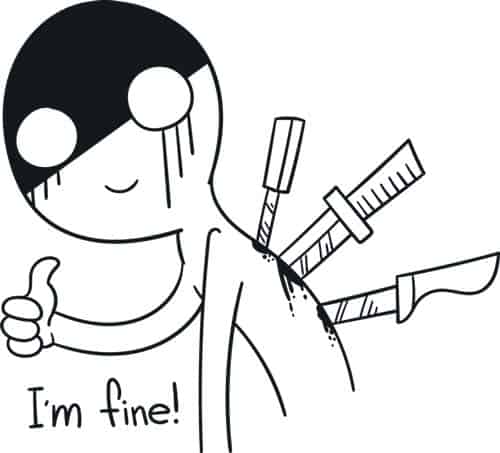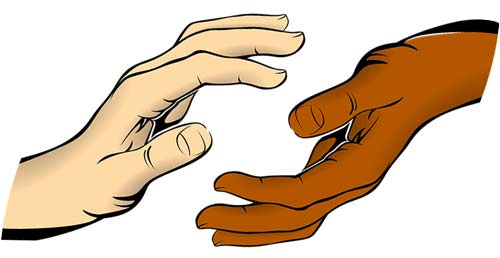6 Signs of a Bad Therapist: Psychotherapy, a word we need to hear and say more often, so it is not stigmatized. We need to have conversation starters, for people to accept Psychotherapy or mental therapy or simple therapy.
Therapy is mental health counseling for people struggling with mental health issues.

Inspiring your journey, one story at a time. #LifeFalcon.
These issues are common, and we find people struggling with emotional disorders, concerning their relationships, daily life challenges and so much more.
A person going through these mental traumas either need to understand self-psychology or get the support of friends, family, or a counselor.
Not everybody is fortunate enough to have a support system wherein he or she is understood and accepted and then helped towards betterment.
Very few fortunate people have families and friends who understand the mental anguish and struggles the person is going through.
These families care and it is heartbreaking for them to see their loved ones going through mental health issues.
They do not stigmatize them but guide them towards looking into therapy options, even going through the different therapists available and deciding on one which suits their needs the best.
Most of the people who are going through different types of mental health issues, want to hide from the world.
Most of us don’t go about a conversation unless we have something to gain out of it, in such a society it is mandatory to have someone who can simply listen to you and understand what you are going through.
We now call this therapy.
Table of Content
When Mental Health Issues Are Left Untreated

If left untreated, these health issues snowball into troubles that become difficult to handle. They get worse having terrifying negative effects.
People going through these difficult mental health issues will have trouble managing their relationships, taking care of their children, managing work, and office.
If these problems are not investigated, they might lead to health risks, hospitalization and in severe cases, the patient takes his own life.
So, Psychotherapy is something that is here to stay, and we must realize that therapy saves life as the benefits of therapy lasts longer than the medicines.
Yes, the patient needs medicines but therapy teaches them to cope with their symptoms which they feel are not responding to the medicines. This is where the role of a therapist comes into play.
Therapy makes you understand what you are feeling, why you may be feeling the way that you are, and what are the ways you can cope with your mental issues, face them and deal with them with support from your family and friends.
Reaching Out For Help

You need to consider therapy if you are going through difficult situations in life wherein you do not have the energy to deal with them anymore.
It could be family related, relationship issues, or work-related. You feel trapped, claustrophobic, and have panic attacks. There will be times when you would feel that you are not good enough.
This is the question you ask yourself repeatedly in your head, Am I good enough? Your self-confidence or your self-esteem takes a nosedive and you want to hide from the world.
You do not want to meet people, keep to yourself, and go further down in this agony. This is the time, people around you should act, and this is where a good therapist helps.
Forcing a mental health patient to visit a therapist does not really work. Friends and family need to talk about it and gradually bring you around to seeing a therapist.
There are of course many things to be considered before you take the plunge. Such as the cost of therapy, because it is a long-term relationship with your therapist, and you need to be financially prepared.
The person dealing with the problems might not feel secure talking about himself to a therapist. You need complete honesty there.
The revisiting of old memories and painful experiences could pull you back a bit but once that wall is dropped and you are honest with yourself and your therapist, and you are willing to do the work, you will learn that therapy can be rewarding.
Finding The Right Therapist

The first step and the most important one would be to research and find yourself a therapist who is ethical and knows how important he and his honest work is for the mental health patient.
Once the therapist is on board, then it is a long journey from there for both of you.
As mentioned earlier, honesty is the key to having a workable relationship with your therapist. You would know on the first day, after your first session with the therapist whether it is workable or not.
You need to feel comfortable with your therapist, to be able to let him into the deep secrets of your life.
Psychotherapy is long-term counseling and it will deal with broader issues, finding out the causes which make you deal with the world the way you are doing.
Their main aim is to make the patient better equipped to deal with the stresses in his life. You might like to ask, is my therapist making me feel better or is my self-confidence plummeting with each therapy session?
As in every profession, therapy also has people who call themselves therapists but need therapy themselves.
They are there to make a business deal out of another person’s misery. However cruel and heartless it may sound, but it is the truth. The world is full of all kinds of people.
So, a bad therapist can literally ruin your life as no one else can. Therefore, choose wisely, this is a relationship that will go a long way and bring positive results.
Find a therapist who makes you feel relaxed and does not make you feel as if you are before an interrogator every time you visit his clinic.
You should be looking forward to your therapy visits and not dreading them. Looking forward to going to a place where you can be yourself and de-stress completely.
A place which does make you feel that you are enough, a therapist who makes you the best version of yourself, by guiding you.
Does therapy really work?

You would like to ask yourself. Yes, it does! Everybody needs somebody to share their burdens with. You cannot go through life’s ups and downs, in solitary confinement, all by yourself.
There comes a time when your troubles seem too overbearing and you cannot seem to cope with them. That is when you need someone to listen, guide, and be there for you.
Consider yourself extremely fortunate if you have a loving and caring family, who is there for you and with you at every step, who understands that you need help and take you to the right person.
A therapist is not a family, but he knows what your family will never know. A good therapist, who knows his job well, will eventually become your closest ally and friend. You share secrets, remember?
So, choose a therapist wisely. You need an anchor at difficult times and a good therapist provides that anchor.
A good therapist will help you cope with your feelings and problems by helping you to change your patterns of behavior in dealing with them.
There have been instances of therapists shedding tears during therapy sessions. That was because they felt touched or sad by situations their clients have been in.
Signs Of A Bad Therapist And Knowing When To Call Off

A therapist might have all the degrees to prove that he is perfect for the position that he is in, but he misses that one thing which is required, empathy, a great deal of empathy. A bad therapist can completely ruin your already troubled life.
Unpunctuality
The first sign that you are dealing with a bad therapist is that he is late, and does not arrive on time for your appointment.
The appointment is important for you as well as for him. For you especially because you are the one dealing with the issues and you need to move on in life putting these issues to rest.
If your therapist arrives late, it shows his irresponsibility and his careless attitude towards your problems.
Your emotional issues and troubles should be as important to him as they are for you. Punctuality shows his concern and worries for you and your troubles. So, he must be there for you on time.
Non-Conversational
You must remember that you are seeking therapy so that you can talk about your troubles and your emotional issues.
You need to talk, and you need to be honest. But if your therapist is keener on talking and explaining, rather than listening, then you are with the wrong guy! If he likes to listen to his own voice then he is in the wrong profession.
A therapist must be a good listener, a friend who listens to you with empathy and understanding.
There are those who do not talk at all. What does that mean? There must be a balance in between, a therapist must talk to when he feels the need to explain something.
Some therapists are not ready to give you information about the therapy they are using and or methods to deal with your problems.
So, they do not talk, they do not give you the detailed information you need, about your own treatment.
Secretive
You have a right to know what kind of methods of therapy he has in mind for you, but your therapist acts secretive.
Not what a good therapist should do. Some therapists think and imagine that their mind is a computer and they can store details there.
It is not possible with new patients coming in every day. These therapists do not maintain files and the result is they miss out on details. They do not remember important information about your case. Something which is of utmost importance to you, a matter of life for you, is considered so unimportant. Time to show him the door!
A good therapist listens to your story and your troubles with empathy and understanding, then work on a method of therapy for you, sharing his methods and his notes with you.
Disregards Your Boundaries
Would you like it if he starts to give you uncalled-for advice? It is not correct on his part to start giving you unnecessary advice on how to do things the right way or how to lead your life.
He is there as a therapist and friend, a person who should use his knowledge and judgment to decide methods of dealing with mental issues rather than sit on his highchair and pass on unsolicited advice.
A therapist must lay down boundaries with his clients and must respect them. If your therapist is trying to get too close to you, emotionally or physically then you need to rethink him as your therapist.
If you feel he or she is being overly friendly, hugging, or initiating other kinds of physical contacts, then you have every right to wonder if this is correct behavior, more so if it is not with your consent.
If your therapist tries to get too friendly, then stay away from him! You need clearly demarcated boundaries and both parties need to stick by these.
Making Intimate Advances
The worst thing your therapist can do is to make sexual advances at you. Whatever is such a person doing in this field?
They should be removed with immediate effect. Get out of the therapy room but not before you give him a piece of your mind.
You go to a therapist because you want to heal yourself, with the help of a professional Psychotherapist. You are there in his therapy room, at your most vulnerable stage, you need assistance and empathy from a person who deals with such issues on a professional level.
But if your therapist is sitting there and judging you on your life, your choices, your sexuality, or even body shaming you in any way, then he should not be in this profession at all.
So, stand your ground and do not allow such judgmental people who act as therapists to take advantage and put you down and in the process feel good about themselves.
A friend faced such a situation once and came out of it with flying colors. He realized his therapist was missing out on the chances of talking about his weight and body shaming him.
Although he was on the verge of bursting into tears, he stood his ground and walked out of the therapy room with his head held high but not before telling the therapist that he was an embarrassment to his profession.
He left the therapy room and found himself a therapist who helped him recover and get back to normal living.
Overt Controlling
Some therapists feel that it is their birthright to control your life, for them you should be having no personal point of view at all.
Your point of view for your own life is unimportant for them. Look for these controlling men signs.
Instead of listening patiently to what you feel or say, they will suggest other means.
They try to influence you and make you feel that your decisions are not good enough. You are in therapy because you need someone to listen, guide, and help you pick up the pieces of your life positively.
If the therapist is trying to put you down and make you feel that the decisions you take for yourself are not good enough, then it is time to leave!
Conclusion
It is absolutely your prerogative to decide which therapist works for you if you are happy with the way things are going on in the therapy room.
No one should be telling you that, for sure! Not a therapist, please! If he tells you he is the best therapist for you then think about it, he cannot tell you that you will not find anyone better than him. Leave immediately and find a better one!
Your worries and troubles are the reason you are there in a therapist’s room right now. Why else would you be there?
In most countries, therapy is confidential according to law. Make sure you sign an agreement with your therapist or the clinic when you start working with them on your case.
They are not supposed to give away your details to your family or anyone else, without your knowledge. Make sure they take your consent before even discussing your case with another therapist.
Remember your therapist is not your friend, in real life, or on social media. Let them be your therapist and treat your case or situation objectively.


















